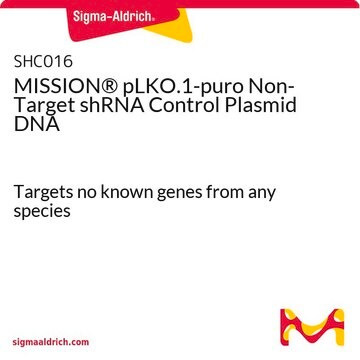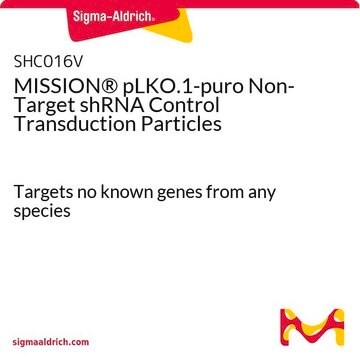SHC001V
MISSION® pLKO.1-puro Empty Vector Control Transduction Particles
Contains no shRNA insert
Synonym(s):
MISSION®, MISSION® Control Transduction Particles
Sign Into View Organizational & Contract Pricing
All Photos(1)
About This Item
UNSPSC Code:
41106609
NACRES:
NA.51
Recommended Products
Quality Level
100
200
product line
MISSION®
concentration
≥1x106 VP/ml (via p24 assay)
technique(s)
capture ELISA: 106 TU/mL using p24
shipped in
dry ice
storage temp.
−70°C
Looking for similar products? Visit Product Comparison Guide
General description
When conducting experiments using MISSION® shRNA clones, the proper controls should be a key element of your experimental design to allow for accurate interpretation of knockdown results. The MISSION Control Transduction Particles are a critical positive control to monitor transduction efficiency.
To see more application data, protocols, vector maps visit sigma.com/shrna.
To see more application data, protocols, vector maps visit sigma.com/shrna.
Application
To see more application data, protocols, vector maps visit sigma.com/shrna.
Legal Information
MISSION is a registered trademark of Merck KGaA, Darmstadt, Germany
recommended
Product No.
Description
Pricing
Storage Class Code
12 - Non Combustible Liquids
WGK
WGK 3
Flash Point(F)
Not applicable
Flash Point(C)
Not applicable
Personal Protective Equipment
dust mask type N95 (US), Eyeshields, Gloves
Certificates of Analysis (COA)
Search for Certificates of Analysis (COA) by entering the products Lot/Batch Number. Lot and Batch Numbers can be found on a product’s label following the words ‘Lot’ or ‘Batch’.
Already Own This Product?
Find documentation for the products that you have recently purchased in the Document Library.
Customers Also Viewed
Efficacy of adjuvant chemotherapy for non-small cell lung cancer assessed by metastatic potential associated with ACTN4.
Miura N
Oncotarget (2016)
Deepak Parashar et al.
Cancer research, 80(24), 5554-5568 (2020-10-23)
Peritoneal spread is the primary mechanism of metastasis of ovarian cancer, and survival of ovarian cancer cells in the peritoneal cavity as nonadherent spheroids and their adherence to the mesothelium of distant organs lead to cancer progression, metastasis, and mortality.
Soft drug-resistant ovarian cancer cells invade via two distinct mechanisms utilizing myosin IIB
Aastha Kapoor
Nature, 099655-099655 (2017)
Chemoresistance is associated with increased cytoprotective autophagy and diminished apoptosis in bladder cancer cells treated with the BH3 mimetic (-)-Gossypol (AT-101).
Mani J
BMC Cancer, 15, 224-224 (2015)
Xiaobo Luo et al.
The Journal of clinical investigation, 130(4), 1635-1652 (2019-12-25)
The incidence of human papillomavirus-positive (HPV+) head and neck squamous cell carcinoma (HNSCC) has surpassed that of cervical cancer and is projected to increase rapidly until 2060. The coevolution of HPV with transforming epithelial cells leads to the shutdown of
Our team of scientists has experience in all areas of research including Life Science, Material Science, Chemical Synthesis, Chromatography, Analytical and many others.
Contact Technical Service







